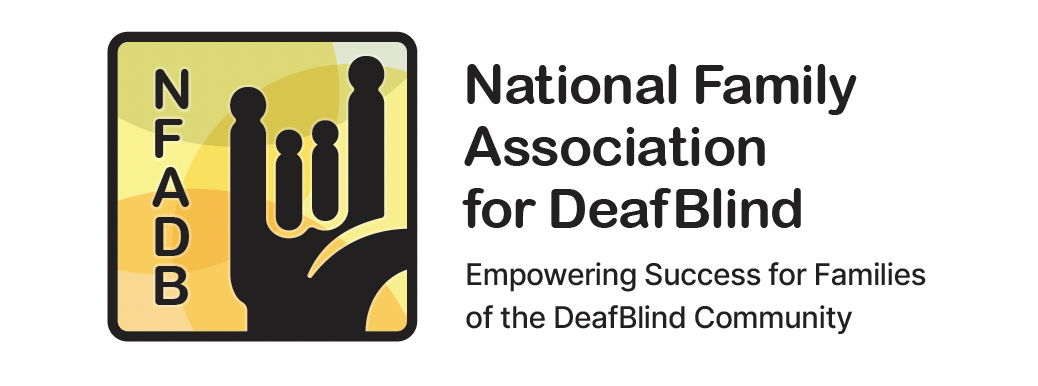The National Family Association for DeafBlind (NFADB) is a nonprofit, 501(c)(3) organization that has served families with individuals who are DeafBlind since 1994.
Originally started by and for families, NFADB has expanded to include any interested individuals, professionals, organizations, and agencies that wish to empower the voices of families with individuals who are DeafBlind and advocate for their unique needs.
We are a Board of volunteers and we work to support families and provide a family voice at events hosted by state DeafBlind projects and national venues, to include the DeafBlind Summit.
Below we have included a national advocacy agenda developed this past year (our pilot year) by family leaders representing twelve (12) family organizations from across the United States. This agenda is a product of NFADB’s Family Advocacy Training and Education (FATE). We are gearing up now for our second year of FATE. You can learn more about this family advocacy training on our website.
Many of those same family leaders are continuing their advocacy efforts to support this national agenda through our newly formed Family Advocacy Coalition Educating (FACE) for DeafBlind. We feel that this agenda expresses a common need for our DeafBlind children, regardless of etiology.
National Advocacy Agenda
1. Require States to include “services to students who are DeafBlind in special education State Plans” via addenda to existing plans & inclusion in future State plans. The plan should include:
Justification - To ensure that our children are properly identified in the child count, which determines allocation of funds to our state DeafBlind projects.
- Qualified Personnel - We suggest that qualified personnel include Teachers of Students who are DeafBlind and Interveners
Justification - For our children it’s not Deaf PLUS Blind, it’s Deaf TIMES Blind, as the dual sensory loss has an exponential impact. They have very unique needs and require teachers certified in DeafBlindness to help them navigate the educational system.
Please read NFADB’s Position Paper on Qualified Personnel.
Justification - Interveners are trained to provide access to environmental information necessary to ensure a free appropriate public education to children who are DeafBlind. Please read NFADB’s Position Paper on Interveners.
-
- Technical Assistance - We urge the Department to provide funding for technical assistance ( i.e., NCDB and State DeafBlind Projects) at levels commensurate with the needs of students who are DeafBlind and their families.
Justification - Families would be lost without State DeafBlind projects. The projects provide a range of services to improve results for us and our children who are DeafBlind.
-
- Transition plans - We request that transition plans to adult life align with a State Plan for Adults.
Justification - Transition planning is mandated by IDEA and helps youth with DeafBlindness get ready for college, vocational training, employment, and community life once they leave school. The plan does not necessarily follow the child into the adult setting, leaving family members scrambling to piece things together.
2. Require States to develop a State Plan for Adults who are DeafBlind. Ensure the timely implementation of appropriate services and supports for adults who are DeafBlind for a successful transition from school to adult life, including but not limited to post-secondary education, the workforce, or other settings.
The goal is a purposeful life of their choice. The plan may include:
- We highly recommend that the state plan for adults be coordinated with the Special Education State Plan (initially).
Justification - Our education team works hard to develop a transition plan to ease our children into adult life. The effort is lost if adult services are not in sync with that transition plan.
- We request that the state plan include the array of support services, to include SSPs/CNs, Interveners, and Interpreters necessary to provide information, access, and communication required.
Justification - Individuals who are DeafBlind require access to their environment and facilitation of communication with people encountered in their surroundings.
- We propose that all states offer a DeafBlind Medicaid Waiver to adults who are DeafBlind.
Justification - Individuals who are DeafBlind have unique needs and some need additional support to maintain their independence in their community, rather than live in a long-term care facility.
We thank you for your interest in ensuring that all individuals who are DeafBlind reach their full potential. We appreciate all that you and your state DeafBlind project do to prepare our children and families. Please reach out to us if you have any questions regarding our continued advocacy efforts.
Respectfully Submitted,
Jacqueline Izaguirre & Melanie Knapp
National Family Association for DeafBlind
www.nfadb.org

